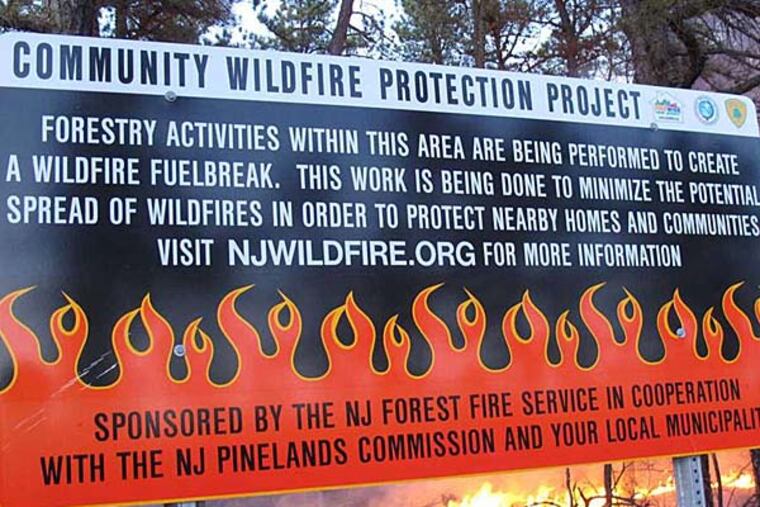N.J. forests at risk, lawmakers say, pushing for burns and logging
Hundreds of thousands of acres of New Jersey's forests are choked with underbrush and vegetation, leaving them vulnerable to massive fires and hindering their use for recreation, state officials say.

Hundreds of thousands of acres of New Jersey's forests are choked with underbrush and vegetation, leaving them vulnerable to massive fires and hindering their use for recreation, state officials say.
Some woodlands are so tightly packed with trees that they succumb - especially when weakened by droughts - to insects and disease.
The growing problems in a state known for its sprawling Pinelands requires a more aggressive, hands-on approach to managing forests, Trenton lawmakers say.
They have proposed bills, now in legislative committees, that would do just that.
A so-called stewardship bill for state-owned lands - sponsored by Assemblymen John F. McKeon (D., Morris) and Paul D. Moriarty (D., Gloucester) - would allow targeted logging to thin overcrowded forests.
And a "prescribed burn" measure - sponsored by Assemblymen Ronald S. Dancer (R., Ocean) and Herb Conaway Jr. (D., Burlington) - would promote more controlled fires on state and private lands to help eliminate dead leaves, brush, and pine cones that can fuel unplanned blazes.
But environmentalists such as New Jersey Sierra Club director Jeff Tittel say the bills are flawed. They will provide an excuse to log and limit the liability of those overseeing prescribed burning, Tittel said.
Finding a balance between the views has been difficult.
"I am against doing nothing," Conaway said. "We have an issue in this state with forest stewardship, and if we're neglectful, if we don't take steps to manage and protect forests, we will lose them.
"I am for achieving a consensus, and protecting the health of the forests and the people who live and recreate in them," he said.
An unmanaged forest "leads to all kinds of problems," said Moriarty. "One problem is massive forest fires that happen spontaneously.
"Almost every state has a forest management program," he said. "Our bill would actually force the state to manage the forests."
The state needs the proposals not only for the forests' well-being but for the "protection of life and property; there are a lot of homes at risk," said Bob Williams, a certified forester who owns Pine Creek Forestry L.L.C., in Laurel Springs, which advises the owners of woodland properties on how to manage them. "We also have to enhance the ecological integrity of the forest."
The forests need burns to avoid uncontrolled fires, and management plans - overseen by the state Department of Environmental Protection - to thin trees. Limited logging would help restore forests to a more natural condition after many years of aggressive fire suppression, officials said.
"You create jobs and products, a true green industry," Williams said. "A good plan would be self-sustaining.
"Trees could be sold or used as barter," he said. "The management activity costs could be paid for by the sales of the trees."
Financial gain may be part of the motivation for the proposed targeted logging, Tittel said. The trees "are worth millions of dollars," he said.
"With all the storms we've had, there has been a lot of natural thinning," he said. "In order to go in, you have to cut roads and create staging areas," which would scar the land.
The stewardship bill also would require that forest management plans comply with the standards set forth by the Forest Stewardship Council, an independent certification organization that assesses and evaluates management plans. New Jersey's plans could cost about $2.7 million.
Gov. Christie vetoed the same bill last year, expressing concern about the power given to the council, an outside nongovernmental group.
"The forest is self-thinning - when we have a massive fire and everything is wiped out," said Moriarty. "That's a danger.
"People can lose their lives fighting fires," he said. "You see that in California, Washington, and Oregon."
Why wait? asked Moriarty. "Why not be proactive? We could thin the forests and make them beautiful for people to enjoy and recreate," he said.
The prescribed-burn bill also is opposed by environmentalists, primarily because it limits the liability of those in charge of the controlled fire and allows the burn on adjacent property without the owner's permission, Tittel said.
The state currently conducts some burns, but has set no standards for them and no mechanism for issuing notifications on lands other than the hundreds of thousands of acres owned by the state. Only about 15,000 acres are usually subjected to burns each year, Williams said.
On Monday, numerous burns were underway in Winslow Township, Camden County; Shamong Township, Burlington County; Lacey and Little Egg Harbor Townships in Ocean County; Estell Manor Township in Atlantic County; Commercial, Downe Townships and Maurice River Townships in Cumberland County; and Millstone Township, Monmouth County.
The proposed legislation would establish a certification program for prescribed-burn managers and procedures for conducting the burns.
"We need to develop stronger standards" than those in the bill, Tittel said. "It can cause more problems than it solves."
Christie pocket-vetoed the same bill in the lame duck session that ended in January.
"The whole reason for burns is to promote public safety," said Conaway. "We can let the forest grow unchecked and increase the risk to homeowners, possibly from a lightning strike, or we can take steps to reduce the fuel on the ground, and leave greater margins of safety."